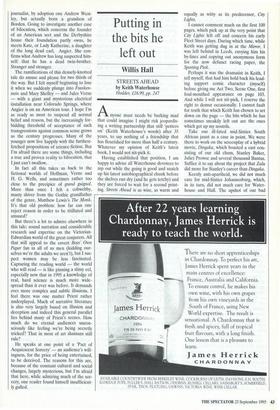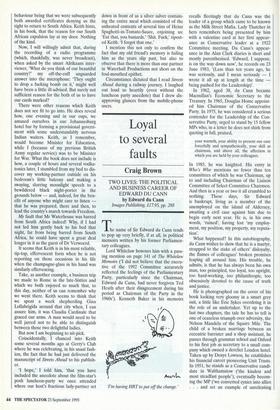Putting in the bits he left out
Willis Hall
STREETS AHEAD by Keith Waterhouse Hodder, £16.99, pp. 247 Anyone must needs be barking mad that could imagine I might risk jeopardis- ing a writing partnership that still 'potters on' (Keith Waterhouse's words) after 35 years, to say nothing of a friendship that has flourished for more than half a century. Whatever my opinion of Keith's latest book, I would not nit-pick it.
Having established that position, I am happy to advise all Waterhouse devotees to nip out while the going is good and snatch up his latest autobiographical chunk before the shelves run dry (and he gets tetchy) and they are forced to wait for a second print- ing. Streets Ahead is as wise, as warm and equally as witty as its predecessor, City Lights.
I cannot comment much on the first 100 pages, which pick up at the very point that City Lights left off and concern his early Fleet Street days. During which time, while Keith was getting dug in at the Mirror, I was left behind in Leeds, envying him his by-lines and copying out anonymous form for the now defunct racing paper, the Sporting Pink.
Perhaps it was the dramatist in Keith, I tell myself, that had him hold back his lead- ing support comic character (myself) before giving me Act Two, Scene One, first foul-mouthed appearance on page 103. And while I will not nit-pick, I reserve the right to demur occasionally. I cannot fault for truth that which Keith has chosen to set down on the page — the bits which he has sometimes sneakily left out are the ones which get up my nostrils.
Take our ill-fated mid-Sixties South African jaunt as a case in point. We were there to work on the screenplay of a hybrid movie, Dingaka, which boasted a cast con- sisting of our old chum, Stanley Baker, Juliet Prowse and several thousand Bantus. Suffice it to say about the project that Zulu did more for Stanley's career than Dingaka.
Keenly anti-apartheid, we did not much care for mid-Sixties Johannesburg, which, in its turn, did not much care for Water- house and Hall. The upshot of our bad behaviour being that we were subsequently both awarded certificates denying us the right to return to South Africa. Keith hints, in his book, that the reason for our South African expulsion lay at my door. Nothing of the kind.
Now, I will willingly admit that, during the recording of a radio programme (which, thankfully, was never broadcast), when asked by the smart Afrikaans inter- viewer, 'What do you think of our beautiful country?' my off-the-cuff unguarded answer into the microphone: 'They ought to drop a fucking bomb on it,' might well have been a little ill-advised. But surely not sufficient reason for the both of us to have our cards marked?
There were other reasons which Keith does not see fit to go into. He does reveal how, one evening and in our cups, we amused ourselves in our Johannesburg hotel bar by forming a provisional govern- ment with some understandably nervous Indian waiters. Keith, as I remember, would become Minister for Education, while I (because of my previous British Army regular service) was to be Minister for War. What the book does not include is how, a couple of hours and several vodka- tonics later, I stumbled from my bed to dis- cover my working-partner outside on his bedroom's little balcony and making a swaying, slurring moonlight speech to a bewildered black night-porter in the grounds below — and, indeed, for the ben- efit of anyone who might care to listen that he was prepared, there and then, to lead the country's march towards Freedom.
My fault that Mr Waterhouse was barred from South Africa indeed! Why, if I had not led him gently back to his bed that night, far from being barred from South Africa, he could have spent a great deal longer in it as the guest of Dr Verwoerd.
It seems that Keith is in his most reliable, tip-top, effervescent form when he is not reporting on those occasions in his life when the champagne-glass in his hand was similarly effervescing.
Take, as another example, a business trip we made to Rome in the late-Sixties and which we both enjoyed so much that, to this day, neither of us can remember why we went there. Keith seems to think that we spent a week shepherding Gina Lollabrigida around that city when, I can assure him, it was Claudia Cardinale that graced our arms. A man would need to be well jarred not to be able to distinguish between those two delightful ladies.
But now I am beginning to nit-pick.
Coincidentally, I chanced into Keith some several months ago at Gerry's Club where he was celebrating, in his usual fash- ion, the fact that he had just delivered the manuscript of Streets Ahead to his publish- er.
`I hope,' I told him, 'that you have included the anecdote about the film-star's posh luncheon-party we once attended where our host's fractious lady-partner set down in front of us a silver salver contain- ing the entire meal which consisted of the unheated contents of several tins of Heinz Spaghetti-in-Tomato-Sauce, enjoining us: `Eat that, you bastards."Shit. Fuck,' ripost- ed Keith. 'I forgot that one.'
I mention this not only to confirm the fact that my old friend's memory is failing him as the years slip past, but also to observe that there is more than one partner in Waterhall Productions not short on the foul-mouthed epithet.
Circumstance dictated that I read Streets Ahead during a railway journey. I laughed out loud so heartily (even without the luncheon party anecdote) that I drew dis- approving glances from the mobile-phone users.



































































 Previous page
Previous page